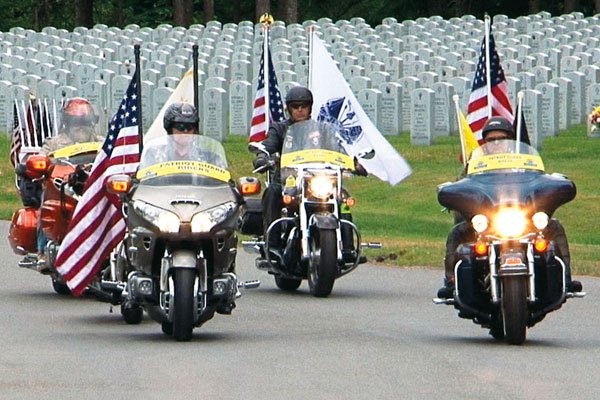by Rebecca Redshaw
For the Sequim Gazette

There’s something to be said for second careers. After 15 years as a professional engineer, Ellen Frick changed the direction of her life when she enrolled in a twice-a-week, seven-month film workshop at the University of Washington.
She clearly was an excel-lent student given the quality of her exceptional documentary, “Patriot Guard Riders.”
Frick will attend the scheduled screening this Friday, Nov. 11, at Olympic Cellars Winery (see box).
All profits from the event will benefit unfunded veteran programs administered through Peninsula Community Mental Health Center.
Frick started work on the film more than two years ago, and like many independent filmmakers, invested her own monies to get the project off the ground.
“One of the first things I did was go on a mission without my camera to see how it felt,” she said. “It feels different when you’re shooting something. It changed me in regards to my attitude toward military personnel and their parents.”
A “mission” for the Patriot Guard consists of escorting fallen soldiers’ funeral processions on motorcycles as well as creating a standing honor guard, each holding an American flag.
Guard gets a start
The organization’s origins came out of frustration and anger at the Westboro Baptist Church. The small religious sect located in Kansas began loudly protesting military funerals and using these solemn occasions to promote their religious views. The Guard, revving motorcycles, formed a legal barrier between the group and the services to protect the families from these hateful outbursts during their time of loss.
In the film, Frick had access to the protesters and gave them just enough screen time to reveal their true nature. This tension between the Patriot Riders and the protesters may have been the catalyst for the film; however, it evolves into so much more. Many of the riders are veterans of the Vietnam war, a conflict that may be just a page in history books for students now, but that still affects the lives of so many who lived through that period.
Frick said, “Since the film came out last March the response has been amazing. I have 8,000 fans on my Face-book page. I get messages from people who have seen the film like ‘I went to see your movie with my uncle who’s a Vietnam vet. He never told me about his experiences until the ride home from the movie.’”
Local ties
The Riders have had a recent local presence. Last July, Capt. Joseph Schultz was killed in Afghanistan and he was honored by many local Guard members at his memorial service held at Olympic Cellars. Owner Kathy Charlton feels strongly about remembering those who served.
“When Betsy’s (mother of Captain Schultz) son was killed in Afghanistan, she asked me to host the memorial service,” Charlton said. “Now when I drive down the road I see the flag. I saw it before, but I didn’t ‘see’ it. I’m sure it sounds like a cliché, but until somebody close to you is killed in a war it’s out there but you don’t feel it. You don’t think about it.”
Whether you know a veteran or an active service member personally, there are hundreds living on the peninsula. The Peninsula Community Mental Health Center has had an active role in serving these men and women since 1986.
Peter Casey, executive director of the center, notes, “We probably are treating a hundred or more vets and families at this time ranging from those who served in World War II up to the current engagements. Surprisingly, given the years that have passed since that war, a lot are Vietnam vets. But that was a war we lost and a war that had little support. People lost their purpose and motivation.”
The opportunity to screen “Patriot Guard Riders” on Veterans Day and to have the film’s director present will bring added attention to services much needed here at home. Profits through ticket sales and donations at the screening will be directed to unfunded veteran services.
“In addition to the three veterans programs in existence on the peninsula, we have people who may not qualify for programs paid for by the government,” Casey said. “That’s where the monies from this benefit will be directed. Even soldiers who were in a noncombat role overseas are still exposed to the terrors of war.” (See veteran client sidebar.)
Audience reaction
Frick also is busy promoting the film through educational screenings and film festivals and was present at the 2011 Port Townsend Film Festival, where “Patriot Guard Riders” was well received.
“I’ve gotten amazing response from film festivals and people who don’t have any familiarity with the military. They didn‘t know about the Patriot Guard Riders and their politics may be a little different than the riders’. The film just got presented at a convention of media librarians. I got orders and I now have an educational distributor for the film. And I have about 150 e-mails to answer from people who are interested in the film!”
The “business” of promoting the film is an important part of the process, but the heart and soul of this film is the way it touches individuals. As the director, Frick interviewed families about the most difficult times in their lives, talked with riders, young and old, and shared their stories with sensitivity and purpose.
What is this film about? Frick answers, “It’s about ‘war.’ It’s about the legacy and tragedy of war. There have only been three years since World War II that we haven’t been involved in war.”
And it’s about those who cannot, do not and will not forget. They ride with respect and honor the fallen — the Patriot Guard Riders.


